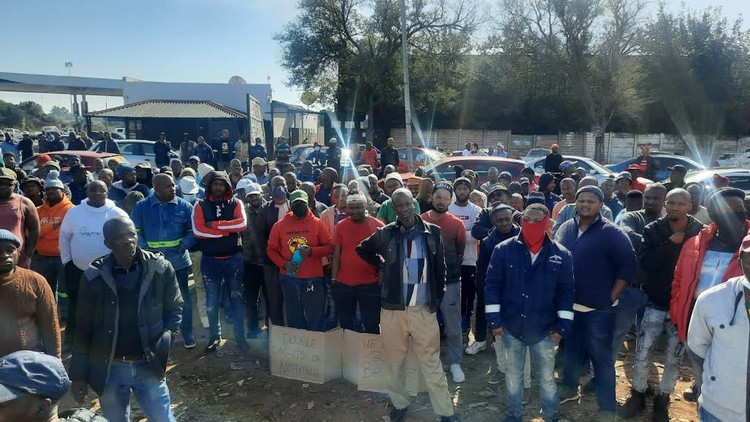Some NUMSA steel workers to return to work after ArcelorMittal wins interdict
Workers demand 10% wage increase
Workers protested outside ArcelorMittal in Vanderbijlpark on Wednesday, demanding a 10% wage increase. Photo: Chris Gilili
- Hundreds of members of the National Union of Metalworkers (NUMSA) downed tools at ArcelorMittal in Vanderbijlpark on Wednesday demanding a 10% wage increase.
- ArcelorMittal is offering 5%.
- Workers were expected to return to work on Thursday, said NUMSA, after the Labour Court granted ArcelorMittal an interim interdict against the strike
Some of the workers at steel giant ArcelorMittal who downed tools on Wednesday are expected to return to work on Thursday after the employer succeeded in getting an interdict, said the National Union of Metalworkers of South Africa (NUMSA).
The workers are demanding a 10% wage increase. The union held demonstrations in different parts of the country where the company has operations, including Vanderbijlpark and Newcastle in KwaZulu-Natal.
As well as a 10% wage increase across the board, NUMSA wants ArcelorMittal to pay 80% of medical aid contributions and to scrap labour brokers and offer permanent jobs to workers in temporary employment. NUMSA said in a statement that the employer had offered a 5% increase which was “not much at all” for the lowest paid worker who earned R7,000 a month.
In Gauteng, the workers marched in and out of the main gates of ArcelorMittal in Vanderbijlpark, chanting and disrupting traffic.
ArcelorMittal said in a statement the company believed its offer was fair considering current economic conditions and the future sustainability of the business. Spokesperson Thami Didiza said the company had won an interim interdict in the Labour Court against a strike by employees at the blast furnaces, coke batteries and steel-making in Vanderbijlpark and Newcastle. “Should these employees continue with the strike, it will be considered unlawful,” Didiza said.
NUMSA spokesperson Phakamile Hlubi-Majola said those workers were expected to return to work on Thursday pending a final court judgment on the strike. She condemned ArcelorMittal for going to court to stop the strike. “They waited until the last hour, so that they could strike fear against the workers,” she said. The union said in a statement that ArcelorMittal had made the application for the interdict because another application - that its business be declared an “essential service” is pending at the Commission for Conciliation, Mediation and Arbitration. Essential services workers have more limited rights to strike.
The union said the Labour Court interdict affected only workers in blast furnaces, coke batteries and the steel plant. All other workers could still take part in the strike.
Lucky Serutla, a general worker at ArcelorMittal in Vanderbijlpark, complained about working conditions. “The company doesn’t want to meet our demands. Some workers have been retrenched and fired, and they don’t employ any additional workers. You find two of us as employees, having to share the workload of about six or seven people. Yet our salaries are not going up,” said Serutla.
Another employee, who did not want to be named, said he supported seven people in his family. ”We cannot afford the standard of living on the same salary as two years ago. Food and petrol are going up frequently. We need the increase,” he said.
Support independent journalism
Donate using Payfast

Next: Post Office no longer paying R350 grant
Previous: Anger at Nelson Mandela Bay Municipality as water runs out and leaks go unfixed
© 2022 GroundUp. This article is licensed under a Creative Commons Attribution-NoDerivatives 4.0 International License.
You may republish this article, so long as you credit the authors and GroundUp, and do not change the text. Please include a link back to the original article.
We put an invisible pixel in the article so that we can count traffic to republishers. All analytics tools are solely on our servers. We do not give our logs to any third party. Logs are deleted after two weeks. We do not use any IP address identifying information except to count regional traffic. We are solely interested in counting hits, not tracking users. If you republish, please do not delete the invisible pixel.

